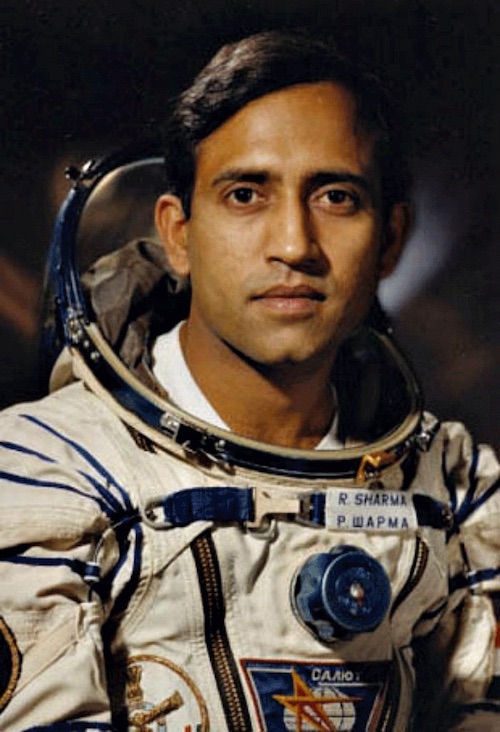Rakesh Sharma

From: April 3, 2018: The Times of India
This is a collection of articles archived for the excellence of their content. |
'My first day in space'
Jan 1, 2017: The Times of India
`I knew space wasn't going to be a bicycle ride' Rakesh Sharma | 67 | Astronaut
On April 3, 1984, my two crew members and I got into the elevator that would take us to the Soyuz T-11 spacecraft at the Baikonur cosmodrome (now in Kazakhstan).Though there was this great sense of anticipation and curio s i t y, I j u s t slipped into my seat in the spacecraft as if it was r o u t i n e. T h e launch was noisy -a lot of vibration and acceleration. I knew this was not going to be a bicycle ride.
After a few hours, we docked with the Salyut-7 space station and were greeted by the cosmonauts who were already there.There were no surprises because it was exactly like the simulator. The food, mostly Russian fare, didn't feel strange either because we had eaten it during our intense training. We immediately got down to business, look ing at the various pro grammes, setting up exper iments...I adjusted to zero gravity quite fast. The work schedule was tight even on the f i r s t d a y.
Whenever there was a break, I enjoyed the scenery outside which was beautiful.
On the second day, I spoke to our PM Indira Gandhi and when she asked how India looked from above, I replied, “Sare Jahan Se Achha.
I would love to go back into space, but this time as a tourist.
As told to Srinivas Laxman
Achievements
The journey to space
April 3, 2018: The Times of India
Rakesh Sharma made history by becoming the first and only Indian to travel to space in a Soviet rocket that was launched on April 2, 1984.
Sharma, a former IAF pilot, was selected in September 1982 to travel into space as part of a joint programme by Isro and the Soviet Intercosmos space programme. In 1984, he became the first Indian to reach space when he flew on board Soviet rocket Soyuz T-11 launched from the Baikonur Cosmodrome in Kazakh Soviet Socialist Republic. The Soyuz T-11 docked and transferred the three member Soviet-Indian international crew to the Salyut 7 Orbital Station. Sharma spent 7 days 21 hours and 40 minutes aboard the Salyut 7 during which his team conducted scientific and technical studies which included 43 experimental sessions.
Sharma’s words while still in space during a televised joint television news conference with officials in Moscow and then Indian Prime Minister Indira Gandhi give one goosebumps even today. When Indira Gandhi asked Sharma how India looked from outer space, he replied Saare Jahan Se Achcha (the best in the world). It was a proud moment for millions of Indian TV viewers who watched India send its first person to outer space.
Rakesh Sharma, reminiscing on his journey in space, he said he felt lonely. “I feel sorry that I'm the only Indian to have been to space and that too 33 years ago. There hasn't been any other Indian, I feel lonely in that sense. I also feel bad that my other two companions on the trip are no more. It was of course, a life changing moment for me. The space journey has impacted me in a great way.”
Sharma said he believed India was never part of the space race. “This is the reason it has reached so far. I believe that is the better way to go about it. We should do our own thing, up to now we have done all the right things. We are in a mode of survival today,” he noted.
He also gave his views on what he wanted the country to achieve. “I would like it to be a voice which shapes an inclusive policy for humans. We are at a threshold where we starting space exploration. We are going to populating the moon first and then Mars. I wish we don't do it by ourselves and alone because it will be resource intensive. I don't think so that it is the best way to utilise our resources given our other needs and compulsion. We are respected in the space community and we can carry our weight for future missions. I'm proud that India's space programme has achieved so much in such a short span of time,” he remarked.
The former IAF pilot was conferred with the honour of the Hero of the Soviet Union upon his return from space, while India conferred its highest peacetime gallantry award, the Ashoka Chakra, on him and the other two Soviet members of his mission, Malyshev and Strekalov.